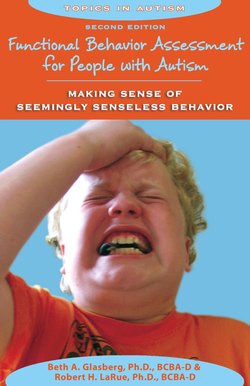Читать книгу Functional Behavior Assessment for People with Autism - Beth Glasberg - Страница 12
На сайте Литреса книга снята с продажи.
Difficulties with Social Skills
ОглавлениеIndividuals with autism spectrum disorders also have social skills deficits. This means they do not engage in social interaction as easily as other people. Similarly, they may not be as skilled at interpreting social responses from others. Therefore, any social reaction they evoke may be rewarding for them. Consider Grace, our second grader who was assaulting her peers. Lacking the skills to have more meaningful social interactions, Grace may settle for the yelling and hitting that her peers are doing in response to her aggression if she cannot evoke friendly responses.
I (BG) was called in to consult with teachers about a preschooler with autism who was exhibiting a similar behavior pattern. This child was a bit larger than the other students in his segregated preschool classroom and was also more interested in socializing than his classmates were. He would often try to approach them appropriately, but would get no response. He then moved on to “belly-bopping” them, bumping them roughly with his belly. Unfortunately, this inappropriate behavior was sure to get his classmates’ attention. Although the attention was often in the form of crying or yelling, for the “belly-bopper,” this was preferable to no response at all. Despite his behavior problem, this child was transferred to an integrated preschool classroom where the other children were more socially aware. In this setting, where the other children responded to his more appropriate initiations, his “belly-bopping” disappeared without any other specific intervention.
Challenging behaviors can also stem from a child’s desire to avoid or escape social contact. Think back to Jamaal, who made odd faces or adopted strange postures whenever his peers approached him. Jamaal’s behavior quickly taught the other children to leave him alone and may have been Jamaal’s way of asking them to go away. Although Jamaal’s educational programming likely focused upon approaching other children and extending interactions, failing to teach children how to end or avoid social interactions is a common teaching oversight. Similarly, Robert, the teenager described above who swatted and poked his siblings to get them to keep their distance, could probably benefit from instruction in social skills for getting out of interactions appropriately.
